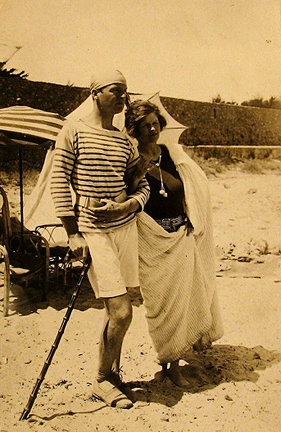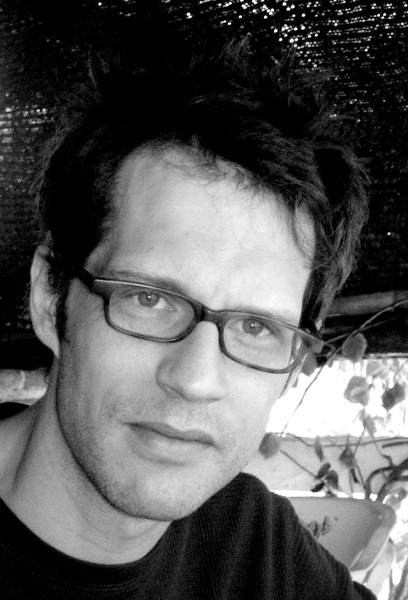Writer/ Director Crispin Whittell Discusses Villa America
Play Based on Sara and Gerald Murphy Premieres at Williamstown Theatre Festival
By: Charles Giuliano - Jul 11, 2007
Taking a break from the final dress rehearsal for a new play, author/ director, Crispin Whittell, called to discuss "Villa
The creation of this new work was initiated when Williams curator, Deborah Rothschild, asked Roger Rees, director of the Williamstown Theatre Festival, if there was some way they might collaborate on a production inspired by the provocative and detailed biography "Everybody Was So Young" by the author Amanda Vaill. The book inspired Rothschild which in turn motivated Rees to contact Crispin resulting in this theatrical experience. After decades of being regarded as wealthy dilettantes and players subordinate to the dazzling array of artists and writers in their circle, Gerald and Sara are now being restored to their proper position as the epicenter of the brilliant but troubling Lost Generation.
The exhibition focuses on Gerald's brief but innovative stint as a painter while Vaill's book and Crispin's play present Sara as one of the great beauties of her day loved and wooed by all of those alpha males that barked at her heels. In the sense that Gerald, known to struggle with bisexual urges, played the gracious patron and host while his famous guests schemed to cuckold him, may present him as a fool or buffoon. But Crispin discussed trying to avoid that, although the Hemingway character and others mocked him behind his back.
Just how did this come about we asked? It appears that Rees was considering another Crispin play for WTF "Darwin in Malibu." Crispin was asked to read the Vaill biography and "See if I thought there was a play in it. I read it and said yes." But he insists that this is not a literal interpretation of the book. It is not a bio or documentary but rather works as a play inspired by what actually happened.
Having read Vaill's book I asked if there would be the scene from the Murphy's Villa
As the Vaill biography demonstrates there is a wealth of material related to the Murphys and their circle and surely this heightened level of interest will spawn further research, critical interpretation and other projects. "Early on in the project I took the advice that you can do too much research when there is so much material" Whittell said. I asked if he had done research beyond the Vaill book. He discussed how he has been trained to read quickly and scan for information that is useful and brush over and not be bogged down by detail. "I had a clear idea early on so I was able to focus on accumulating what I needed. It seemed to me that there were four couple whose marriages were in trouble in different ways: The Murphys, Picasso who was then married to Olga, F. Scott Fitzgerald and Zelda, as well as Ernest Hemmingway who was then married to Hadley. The men were all in love with Sara. There was something about her that drew men to her. So she is one of only two woman in the play. There is also a French governess and a bit of doubling."
Just what is the time line I asked? "There are four scenes starting with 1968 when Gerald had been dead for four years. Then, 1926 when the Fitzgeralds were coming apart. The summer of 1923 when Picasso spent a lot of time with them at the beach. Finally, 1915 in
While the Murphys were often dismissed as dilettantes and socialites they in fact had remarkable skills as Whittell sees it. "They virtually invented the
There is the prevailing notion that the Lost Generation was about gifted American's fleeing the "Babbitt" of Sinclair Lewis to breathe Paris air with its great freedom. There one could be gay, or black (Jospehine Baker and Gertrude Stein) without the repression of
In the play we asked how Whittell presents Gerald who was known to struggle with bisexual urges and was taken advantage of by their "friends." How not to see him as a buffoon surrounded my men trying to woo and seduce his wife? "His personal style was so idiosyncratic that on stage he could turn into a clown" Whittell said. "You don't want to play these famous people as icons and legends. We must remember that they were real people who spent the summer on the beach in the South of France. So I have attempted to create an impression of who Gerald was and not make a fool of him. His friends could be savage behind his back."
And how does Whittell handle the alleged bisexual struggles of Gerald? "Life is about what we reveal and what we conceal" he said. " As a playwright I am not an enthusiast of knocking people over the head. Theatre is a place where ambiguity is still permitted. My approach is to show that how hard someone tries to conceal something in fact reveals them. My sense is that he was bisexual but not practicing and that this was the source of tremendous pain for him."
To what extent was it a factor that this was commissioned work and not a project that he initiated on his own? Is he just the hired gun brought in to realize someone else's project and vision? "I hope I made this my own" Whittell said. "I fell in love with the material so I never got stuck. I never felt 'Oh God, how did I get into this.' It is never a pleasure to write but this was as close to a pleasure as a writer can get. Once that you know where something is going it occupies you totally. You don't get a break until you deliver. Then the fun is doing it. Writing is a lonely business. But the great thing about theatre is that you get to do this with other people. Once you have finished suddenly there are other people. You have company. You are no longer alone in your room (A Room of One's Own) but you are in a room with lots of other people."
And for the next two weeks he will enjoy that company. What happens after that? "You can never think of that" he said. "You just focus on writing the play. What happens after that is up to other people. You can't worry about what you have no control over. Now and then something catches on and goes on to have a life of its own." Man, that's a tough gig.



